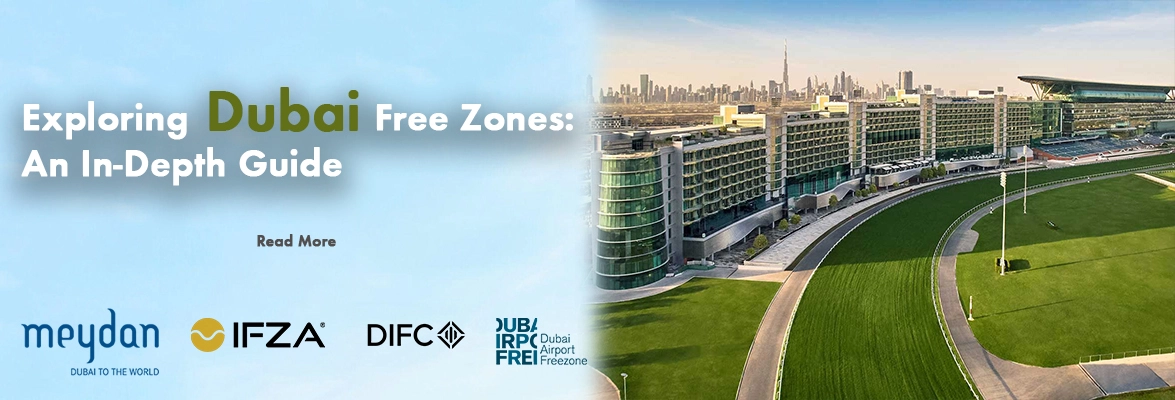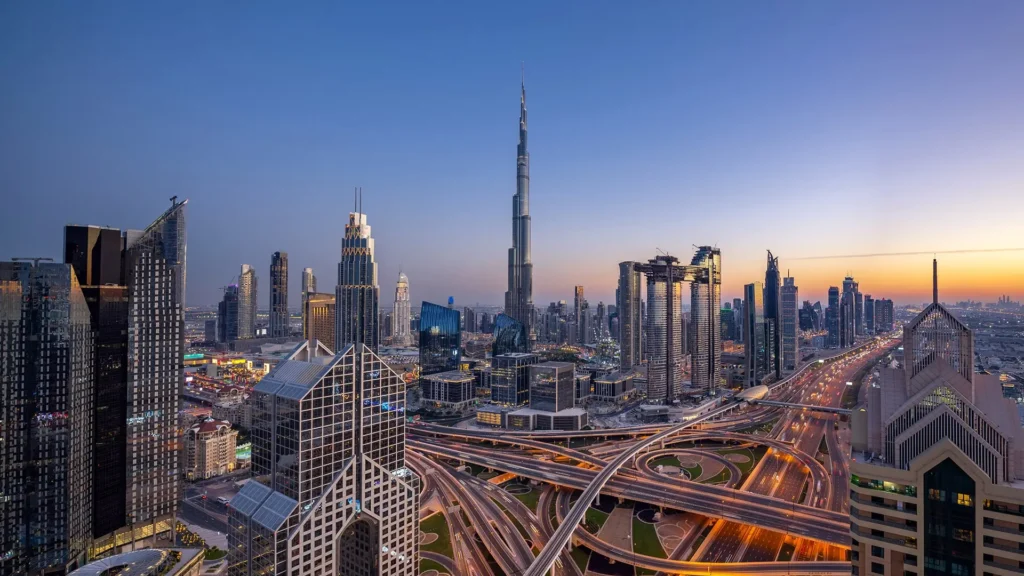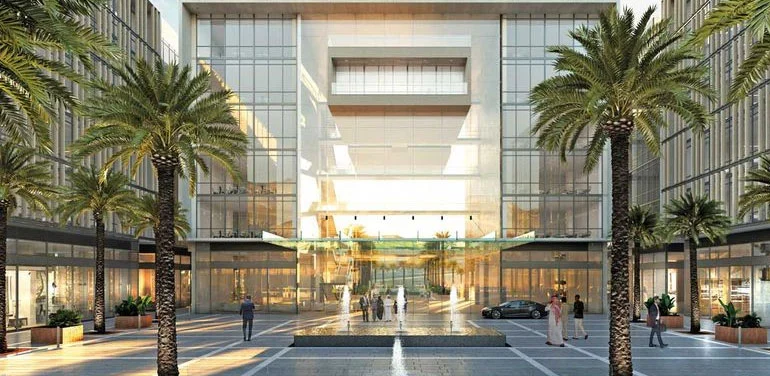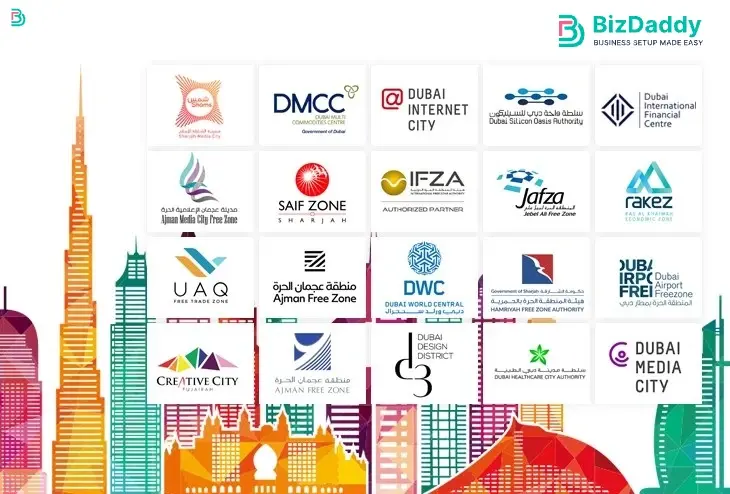
Free zones are seen as an ideal platform for companies to get involved in trading, assembly, packaging and manufacturing as well as for processing, mixing, value-adding and others. Each free zone operates as an autonomous jurisdiction, offering investors a rich range of varying possibilities for investment. The investment risk involved in the start-up of new ventures is significantly minimized by the free zones.
Free zones in the UAE are special economic zones set up with the objective of offering tax concessions and customs duty benefits to expatriate investors. Free zones are commonly organized for promoting most business activities, particularly in the areas of trading and manufacturing, and they are governed by a separate framework of rules and regulations which are often different from those applicable in other areas of the UAE.
Free zones play an important role in foreign direct investment (FDI) attraction in the host country. With the establishment of free zones, the government incentivizes foreign investors. Moreover, free zones facilitate decision-making processes for investors. By improving the efficiency of decisions, unnecessary application processing or the difficulty of doing business, time and resources are saved. Countrywide operation conditions for foreign investors make it easier to make strategic decisions and give investors confidence. Free zones can attract various types of FDI. Every type of FDI can have a transformative effect on the host country.
By definition, free zones are designated areas where businesses operate under conditions that are not applicable in the rest of the country. Free zones implement special laws and regulations. These include a reduced corporate tax, customs duty exemptions, full ownership for foreign entrepreneurs, the ability to remit profits, and free capital transfer. The purpose of free zones is to attract and promote investments. When speaking about free zones, many people think about manufacturing, warehouses, and exports. However, it is not always so. Many of the free zones deal with trading activities, providing the infrastructure for the products to be shipped all over the world. This structure aims to attract small and medium businesses who might not have the financial strength to open a company in the mainland and who do not require a physical office inside Dubai.
These free zones attract companies across almost all sectors and industries, right from technology to finance, and from media to education. When it comes to setting up a business in a free zone, it really is a case of what suits you best. With so many options to choose from, doing your research online or with the help of a company formation adviser is an excellent way of getting to grips with the different benefits offered by each zone.
Dubai is home to numerous free zones, each catering to various industries and business needs. Some of the most well-known free zones include the Dubai Airport Free Zone (DAFZA), renowned for its proximity to the airport and ideal for logistics and aviation-related businesses. The Jebel Ali Free Zone (JAFZA) is one of the oldest and largest, offering extensive facilities for manufacturing and trade. The International Free Zone Authority (IFZA) is popular for its flexible business setup options and cost-effective solutions. Meydan Free Zone, located near the famous Meydan Racecourse, attracts companies in various sectors with its strategic location and modern infrastructure. Dubai Silicon Oasis (DSO) is a technology park that supports IT and tech startups. The Dubai Multi Commodities Centre (DMCC) is a leading hub for commodities trade, especially in gold and diamonds. Dubai Healthcare City (DHCC) is dedicated to medical services and healthcare industries, while the Dubai International Financial Centre (DIFC) serves as a global financial hub. Dubai Knowledge Village fosters educational institutions and training centers, and Dubai Media City is the epicenter for media and advertising companies. Each of these free zones offers unique benefits and opportunities, making Dubai a prime destination for business setup and growth.
One thing to bear in mind, is that upon the formation of a free zone company, you need to apply and receive an immigration card to hire employees. Also, know that companies in the free zone are not meant to do business directly within the United Arab Emirates. If you want to look at trading or general business, a non-free zone or LLC is better.
Dubai provides a wide variety of free zones, each dedicated to specific industries, sectors, or types of businesses. Be it technology or innovation, craft or design, or media and medical sectors it serves, every company finds its ideal free zone destination in Dubai. As of now, a total of 38 free zones cover the Dubai map, including industry-specific zones at Dubai World Central (DWC) such as Al Maktoum Airport Free Zone and DWC Aviation City.
Setting up a business in a Dubai free zone offers numerous benefits, which is why they have become so successful. Key advantages include 100% foreign ownership, allowing investors to retain full control over their enterprises without the need for a local partner. Businesses can also enjoy 100% repatriation of capital and profits, ensuring that all earnings can be transferred abroad without restrictions. Additionally, there is no corporate income tax for 15 years, with the possibility of an unlimited extension, providing long-term tax stability for companies. The absence of import-export duties reduces costs for businesses involved in international trade. Moreover, there is no personal income tax, making the financial environment even more attractive for both business owners and employees. Finally, no currency restrictions mean that businesses can operate with financial flexibility, further enhancing their ability to thrive in the global market.
![]()
While each of the free zones is unique, each of the companies’ company formation specialists can guide you through the process so that you just pick the right location for your business purpose, with accurate considerations on cost, budgets, business aspirations, operations, personnel, and more. In general, free trade zones offer a wide variety of benefits, including 100% foreign ownership, tax exemption, repatriation of profits, exemptions from corporate tax, 100% import and export tax exemptions, and no currency restrictions. The procedure for setting up a business in the free zone will vary depending on the specifics of the free zone in question. While the company structures and the licensing requirements may differ, when your specific circumstances are taken into consideration, it is business formation specialists that will use their in-depth expertise to help you.
Dubai’s free zones cater to a wide range of industry verticals, providing specialized environments to support diverse business activities. In the Technology and Telecommunications sector, areas like Dubai Silicon Oasis offer advanced infrastructure for IT and tech startups. The Healthcare industry is supported by Dubai Healthcare City, which focuses on medical services and healthcare innovation. Media and Entertainment companies thrive in Dubai Media City, which provides facilities for media production and advertising. The Logistics sector benefits from zones like Jebel Ali Free Zone and Dubai Airport Free Zone, which offer strategic locations and comprehensive logistics services.
The Automotive and Industrial Equipment industry is well-served by various free zones, providing ample space and resources for manufacturing and distribution. The Energy and Environment sector finds support in zones that focus on sustainability and green technologies. Education and Training institutions have a dedicated space in Dubai Knowledge Village, promoting academic and corporate training excellence. The Jewelry and Luxury goods sector flourishes in zones like Dubai Multi Commodities Centre, which facilitates trade in precious metals and gemstones. Lastly, Recruitment and Staffing companies find favorable conditions in several free zones, enabling them to manage human resources efficiently and effectively. Each of these verticals benefits from the tailored infrastructure, regulatory advantages, and business-friendly environment offered by Dubai’s free zones.
Setting Up a Business in Dubai free zones
One thing that you have to know is that Dubai free zones don’t have a single business license that covers all. Instead, there are specific authorities for specific types of businesses. The media city, for example, is governed by the Dubai Technology and Media Freezone Authority, while others have an independent authority. Therefore, when setting up your company, ensure you have a clear definition of the sort of business that you will be conducting. Research on the various authorities and contact the one that is in charge of governing your type of business.
In the parts of setting up a business in Dubai free zones, you will need to come up with a business plan. This will be essential since it will be submitted for approval to the authority. The expenditure on set up will vary from one person to another, as well as other factors. Once you have financed your business and you are ready to start, then as well, you will need to make an application for a visa to relocate. You also need to get clearance from the police from your home country to proceed to the UAE. These aforementioned steps are very important, and you need to sit down and weigh everything well as they can prove to be very challenging. Keep in mind that you will need to leave some weeks for them to be fully completed.
Legal Requirements and Procedures
The legal requirements and procedures of company formation for a DES or Dubai Free Zone Company (FZD) are simple compared to DED registered businesses. However, there is a variety of legal requirements and procedures that must be completed; these are set out below.
Facility Rent Contract
An application to the Free Zone Authority must be submitted for approval. The Authority issues a business license with which a business can initiate its operations in the free zone. An entrepreneur can initiate the business formation process in DED as well as with the DES or other Dubai free zones simultaneously. However, up to this step, actual business registration is not complete because of the absence of a complete set of required documents and issue of the accompanying documents including visas, required to authenticate the business license. Both steps must be completed to acquire the fully authorized permit to commence operations.
From a start-up perspective, costs and fees can have a significant impact on the decision to establish a presence in a particular free zone. A rough guide of costs and fees for each free zone can be found at GovME. However, as the decision to select a free zone location can be subjective, applying specific cost expectations to individual business activities will be somewhat speculative. These conditions can change from time to time, and for the latest decisions and inquiries, business consultants such as PRO Partner Group can typically provide an accurate guide for established businesses or start-ups seeking specific data.
Free zones are not immune to commercial and research tools, offering ample information on the types of services and conditions at each free zone. A typical business plan includes costs of setting up the business (which could well involve legal, accounting, logistics, rent and public authority fees), operational costs, and investment costs. Publicly available data on rents are often provided by real estate agents, taking specific business requirements into account. In addition to an analysis of procedures to set up, relevant costs should also include costs for foster services and the significant contribution to institutional costs of the destination. Influential factors in the cost comparison of free zones include proximity regulations requiring an Emirati local partner, a minimum office space to operate licenses and related activities, and labor or property costs. Because of the very wide variation of services offered, it is difficult to provide a comprehensive analysis in this section.
There are approximately 40 free zones in the United Arab Emirates, with close to 30 of those being located in the emirate of Dubai. What are some key free zones in Dubai? Among some of the most notable free zones in Dubai, where a great number of businesses have been established and are operational, are the following:
- Dubai Airport Free Zone:
Located adjacent to the Dubai International Airport, this free zone is exclusively for companies involved in freight and air travel or have other needs that are in some way related to the airport. Many top international corporations have set up shop here.
- Dubai Internet City:
This free zone aims to deliver a home to companies of technology and communication that are involved in the innovation and development of various forms of communication technology and their related needs. The free zone also links members to Dubai Knowledge Village, which is an institution dedicated to excellence in research and development.
- Dubai Knowledge Village:
This free zone has been created in order to promote the development of education and training in the academic and corporate sector through the advancement of knowledge. It not only provides opportunities and services to knowledge-based industries but also enables universities and institutes to establish the standards and structure needed to offer academic degrees across various areas of interest.
- Dubai International Financial Center:
This free zone caters to businesses that are focused on the financial sector and seeks to foster growth in financial services by creating a first-class hub for financial services.
- Dubai Media City:
This free zone is catered to printing, publishing, advertising, and communication entities with a particular focus on new-age media. Its aim is to support the strengthening of Dubai’s media grip as a leader in the improved media, making Dubai a leader in the media and IT arena.
- Dubai Healthcare City:
This free zone is dedicated to advancing the healthcare sector and aims to be an industry leader in setting the standards for high-quality healthcare.
- Jebel Ali Free Zone (JAFZA)
JAFZA is one of the oldest and most well-known free zones in Dubai. JAFZA is home to 7,000 companies and supports over 135,000 jobs. It covers an area of over 50 km2 and is home to over 100 Fortune Global 500 enterprises. The business community is said to hail from 135 countries. JAFZA operations are relevant to various sectors such as industrial, services, commodity, general trading, and e-commerce to name a few.
The free zone offers the following benefits to companies. First, companies can take advantage of 100% foreign ownership without the need of a sponsor. Second, it allows 100% repatriation of capital. Third, offers 0% import and 0% re-export duties among many other tax benefits including 0% corporate personal income tax for a specified period of time and subject to a specific requirement. Fourth, companies in the free zone are exempted from value-added tax (VAT) among many other benefits.
JAFZA also provides commercial office space within the free zone or in the surrounding business community. They provide offices and features at four different areas with diverse unique interior designs to fit the varying color of the business interests. The free zone has many offices available with a flexible payment plan. You can search for and reserve offices based on your unique choice on the official website. JAFZA also offers industrial licenses. A number of licenses serve prospective business setups for light manufacturing activity, heavy industrial, general trading, and micro business activity. Business owners can register their companies and predict their license in JAFZA. These activities are allowed in pre-built standard warehouses or in ready-to-occupy land.
The free zone also helps with a number of business types including business incorporation (LLC, branch, and company), the change of local sponsorship, the change of partners, and the renewal of trade license among several others. With the e-license initiative, you can renew your JAFZA license or amend your company profile. Additionally, the customer facilities also allow the provision of worker quotas against companies with a valid license. You can see the quota list and apply for, cancel, or get a labor list deletion approval for companies that have applied and received their initial PRC and have submitted the same to the ministry of human resources. JAFZA also implements comprehensive safety standards to manage all observed risks on site. To enhance security within the business park, the zone has mandated a set of policies covering general regulation compliances including fines and penalties in case of non-compliance.
To register a company and set up a business in JAFZA, enter in legal agreements. Establish improved policies and rules that allows the widespread network of branches. This will help to maintain the high benchmark of corporate governance. To identify your personnel easily by flashing their ID cards at Al Massa Complex, level 8 to get access to the required floor. Also, commercial licenses can be easily obtained to manage property management on the ground floors of the buildings. Be facilitated in an on-site service for e-medical filing at the Al Masood Tower and the Hospital Complex, Ground Floor. Avoid the urban traffic chaos with the metro feeder bus service that will get you into the JAFZA community from the metro stations in Jebel Ali. With many key factors in favor of setting up a business in the JAFZA, you can take advantage of the growth and business productivity.
- Dubai Multi Commodities Centre (DMCC)
The DMCC is the most popular free zone in the UAE, and it is said to be the fastest growing free zone. It is an alliance of three excellencies: commerce, community, and copiousness. Over the years, Dubai has emerged as a transnational trading hub for commodities, which has enticed top-notch firms to take advantage of its cheap energy and logistics costs, among others. The DMCC free zone houses more than double a thousand tenant companies and offers an unfathomable range of services and facilities to cater to their business needs. It is the world’s number one free zone for businesses, as it offers an ultra-modern, genuinely useful response to the most significant needs of the international trade and sharing economy. DMCC provides supreme physical and financial infrastructure, including the vital connection to 90% of the world market, enabling traders to ensure that business flows efficiently.
Dubai offers an unassailable combination of compelling advantages with wide-ranging experiences to help client networks equip and enable them to achieve their objectives of growth, diversification, and market opportunities across a range of specialties. Dubai catering and free zones is one of them. It delivers benefits that come with a global, dynamic business network, prime locations, flawless processes, smart innovative service, and a secure environment for people and their businesses. DMCC came out as the specialist in the business sectors, including gold, diamond, and commodities sectors. Its clients gain direct right to market by making the most of growth potentials of specialized and subscriber communities. With more than 2,000 member companies and over 10,000 professionals, the DMCC free zone provides an array of services to cater to business needs.







Understanding Dubai’s free trade zones is crucial for global businesses due to their unique advantages such as tax exemptions, 100% foreign ownership, and streamlined logistics. These zones significantly enhance international trade opportunities, making Dubai a strategic hub for global commerce and investment.
Great article about Dubai Freezones and their business opportunities
Amazing article about UAE Freezones and their examples.
Dubai’s freezones have a lot of variety and have a lot to offer. Reading this article truly opened my eyes to this revelation.
Great article about Dubai free zones. It thoroughly covers it and it’s a great piece of information for those planning on huge investments.
An ideal develop for companies to get involved in trading Dubai free zones
Amazing article …..
This guide on Dubai Free Zones is incredibly insightful! Understanding the unique benefits each zone offers really helps when deciding on the best location for business setup. For anyone considering UAE expansion, the information here on tax advantages, ownership options, and sector-specific benefits is invaluable. Dubai’s free zones clearly cater to diverse industries and simplify the setup process – this blog covers it perfectly!